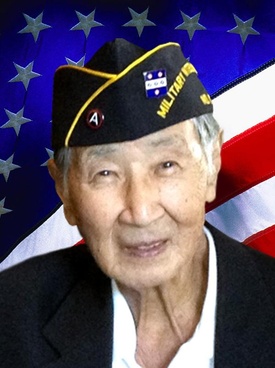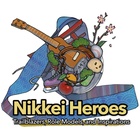Shinya Honda was my hero because he never looked back. He always persevered and took responsibility for his own life and even took care of his mother and three sisters. Uncle Shin never complained about his circumstances or the terrible events that took place at the age of 15, when his father died.
Above all, I am grateful to Uncle Shin and his whole generation who worked hard to serve our country. In spite of the incarceration in concentration camps and this tragic black mark in American history, the positive attitude of Uncle Shin, being a cheerleader for his children, nieces and nephews, makes Uncle Shin a wonderful role model and a hero to all of us, forever.
Shinya Honda received the Congressional Gold Medal for his service during WWII in the US Army MIS (Military Intelligence Service). He said it was the highlight of his life. Uncle Shin was drafted in the US Army at the age of 18, while in his second semester of college in Cincinnati, Ohio where he was studying to be a doctor, like his father (Dr. Rikita Honda). However, he had to drop out of college and serve his country. My grandmother, Mae Tatsuyo Honda, was so proud that her son would be fighting for her beloved USA. (Mae had marched in the victory parade on Market Street in San Francisco after the end of WWI and was one of the most patriotic people I have ever known.) On the other hand, my mother, Mariko Honda, was fearful for her only brother and said to my grandma, “But, Mom, he could be killed!” Mae brushed off any thought of that being a possibility!
Uncle Shin trained at Ft. Snelling in Minnesota and graduated in 1945. He was shipped off to Germany to serve in the occupation forces, attached to General Patton’s Third Army. After the end of WWII, Uncle Shin enrolled at UC, Berkeley and majored in Business Administration. Subsequently, he went then to NYU (New York University) to get his MBA (Masters in Business Administration).
After WWII, there was a lot of discrimination against Japanese Americans, but Uncle Shin, his mother, and his three younger sisters persevered and never dwelled on their experiences in the concentration camps. They never looked back at their terrible times. The past was the past. It was a blessing and a gift to the next generation because we never carried any anger, bitterness, or resentment. We did the best we could in school, worked hard and endeavored to get the best jobs we could out of college. And, it is a testament to Uncle Shin’s generation and my grandmother’s generation that they made the best of a bad situation.
Uncle Shin and the family did not talk about their hardships and challenges. All eleven of us in the next generation were able to think of ourselves as citizens, just like every other child in America. We saw and felt few, if any, barriers to entry and were able to realize our dreams. It is the strength and hard work of our parents and grandparents who found ways to make good livings for their families.
Uncle Shin, at the age of 15, became the head of the household after his father, Dr. Honda died on December 14, 1941 (under questionable circumstances, while under imprisonment by the FBI on Terminal Island. Dr. Honda had been arrested at his home on December 7, 1941). But, the family carried on and my Uncle Shin assured my grandmother that he would take care of her and his three sisters, which he always did. Uncle Shin is a testament to the hard work of his generation and a blessing to future generations, if we can remember that America is the greatest land of opportunity in the world and that hard work and perseverance result in great careers and lives. Uncle Shin always reminded us that “where there is a will, there is a way.”
© 2019 Beverly Sugimoto




